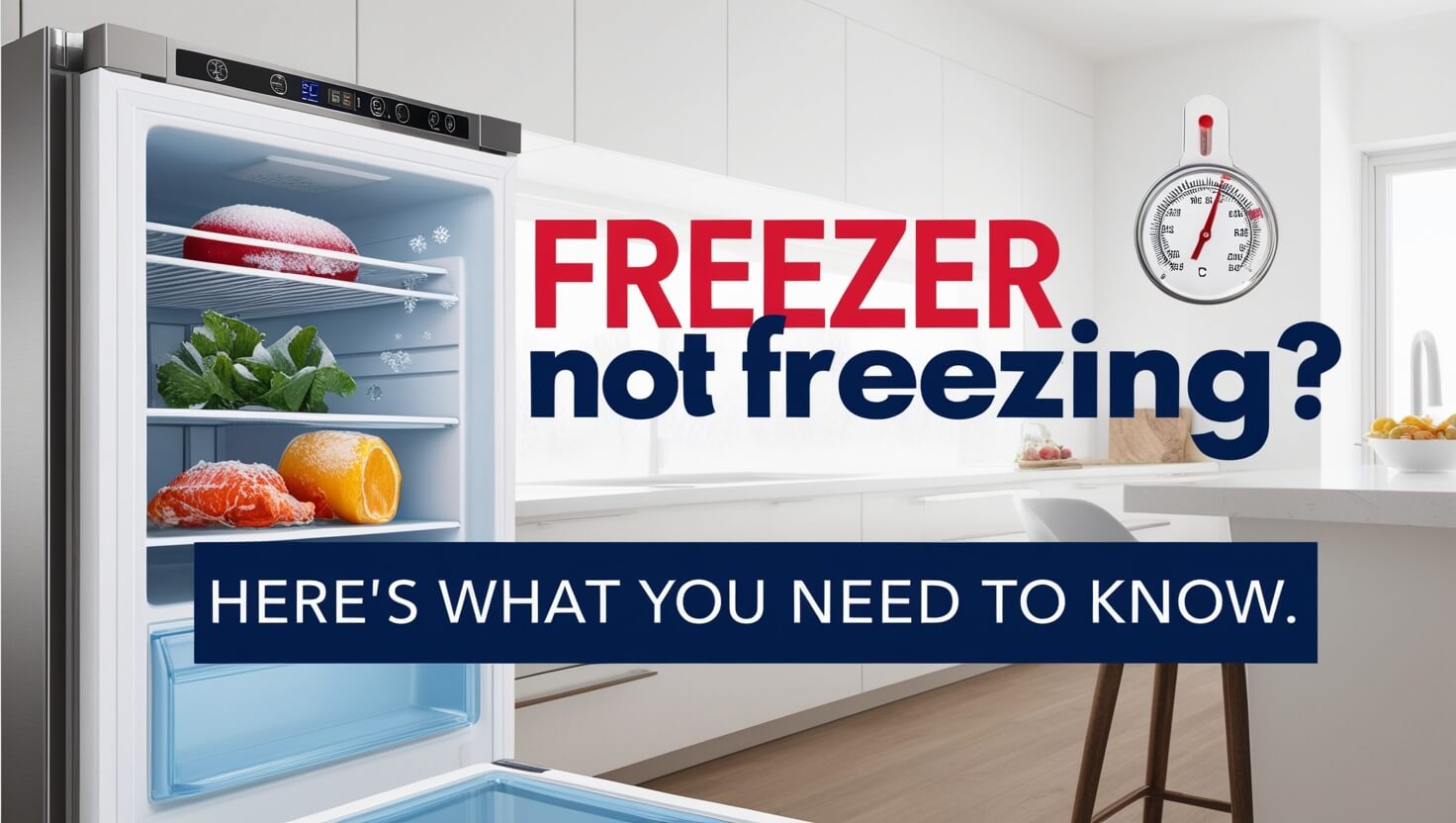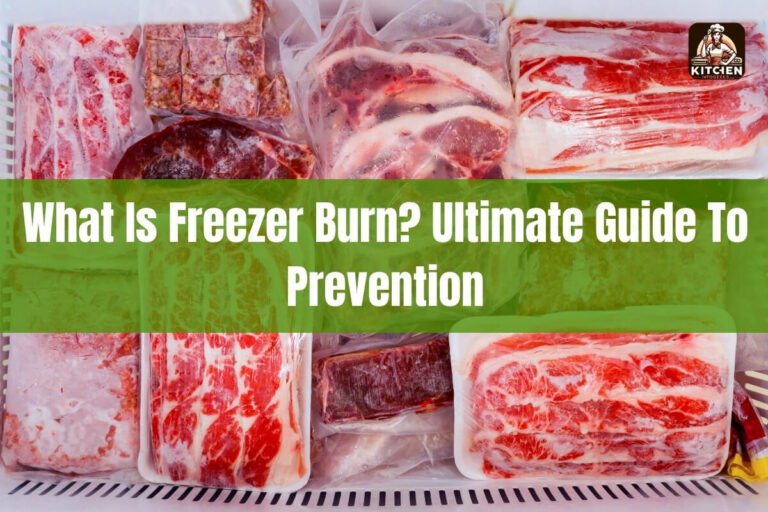
Is your freezer not freezing properly? You’re not alone. A freezer that fails to maintain the right temperature is a common household problem that can lead to food spoilage and frustration. In this guide, we’ll explore the reasons behind this issue, offer troubleshooting tips, and provide solutions to get your freezer back to its chilly best.
Freezer’s Cooling System
To tackle the problem of a freezer not freezing, it’s crucial to understand how these appliances work.
How a Freezer Should Work
Freezers rely on a complex system of components working together to keep your food icy cold. The main parts include:
- Compressor
- Condenser coils
- Evaporator
- Thermostat
When working correctly, this system circulates refrigerant, removing heat from inside the freezer and expelling it outside. The result? A consistently cold environment that keeps your food frozen.
Common Causes of Freezer Cooling Problems
Several issues can disrupt this delicate cooling process:
- Dirty condenser coils
- Faulty door seals
- Malfunctioning thermostat
- Blocked vents
- Overpacking
Identifying these problems early can save you time, money, and a lot of melted ice cream.
Signs Your Freezer Isn’t Freezing Properly
Catching freezer issues early can prevent food waste and costly repairs. Here are key indicators that your freezer’s not keeping its cool:
Temperature Fluctuations
A properly functioning freezer should maintain a steady temperature of 0°F (-18°C). If you notice the temperature rising above this point, it’s time to investigate.
Frost Buildup
While some frost is normal, excessive ice accumulation can signal a problem. It might seem counterintuitive, but too much frost can actually prevent your freezer from cooling effectively.
Thawed or Soft Foods
Finding partially thawed foods or soft ice cream is a clear sign your freezer’s not freezing as it should. This issue requires immediate attention to prevent food spoilage.
Troubleshooting a Freezer That’s Not Freezing
When your freezer stops freezing, don’t panic. Start with these troubleshooting steps:
Check the Power Supply
It might seem obvious, but always start here. Ensure your freezer is plugged in and the circuit hasn’t tripped. A simple power issue could be the culprit behind your freezer not freezing.
Inspect the Door Seal
A damaged or dirty door gasket can let warm air in, preventing your freezer from maintaining the right temperature. Check for any gaps or debris in the seal.
Clean the Condenser Coils
Dirty coils can’t efficiently release heat, making your freezer work harder. Locate the coils (usually at the back or bottom of the appliance) and gently clean them with a vacuum or brush.
Examine the Evaporator Fan
This fan circulates cold air throughout the freezer. If it’s not working, your freezer won’t cool properly. Listen for the fan when you open the freezer door – if you don’t hear it, it might need replacement.
Test the Thermostat
A faulty thermostat can’t regulate temperature correctly. Try adjusting the thermostat to see if it responds. If not, it might need replacing.
Easy DIY Fixes for a Freezer Not Freezing
Before calling a professional, try these simple fixes:
Proper Food Storage Techniques
Overpacking your freezer can block air circulation, leading to uneven cooling. Aim to keep your freezer about 75% full for optimal performance.
Manual Defrosting
If your freezer isn’t self-defrosting, regular manual defrosting can improve its efficiency. Follow these steps:
- Remove all food items
- Unplug the freezer
- Leave the door open
- Remove loose frost with a plastic scraper
- Wipe down the interior
- Plug it back in and restock once it reaches the correct temperature
Cleaning and Maintenance Tips
Regular cleaning can prevent many freezer issues:
- Wipe down the interior monthly
- Clean door seals with warm, soapy water
- Vacuum the coils every 6 months
These simple tasks can keep your freezer running smoothly and prevent it from not freezing properly.
When to Call a Professional for Freezer Repairs
Sometimes, a freezer not freezing requires expert help. Consider calling a pro if:
Complex Issues Requiring Expert Help
- You hear unusual noises
- There’s a persistent burning smell
- The freezer’s exterior feels warm
- DIY fixes haven’t solved the problem
These symptoms might indicate more serious issues with the compressor or refrigerant system.
Cost Considerations: Repair vs. Replace
Before investing in major repairs, consider the age and condition of your freezer. If it’s more than 10-15 years old, replacement might be more cost-effective in the long run.
Preventing Future Freezer Cooling Problems
An ounce of prevention is worth a pound of cure, especially when it comes to keeping your freezer freezing properly.
Regular Maintenance Schedule
Mark your calendar for these routine tasks:
- Monthly: Clean the interior and check the door seal
- Every 3 months: Check the temperature with a thermometer
- Every 6 months: Vacuum the condenser coils
- Yearly: Inspect the drain pan and defrost if necessary
Best Practices for Freezer Use
Follow these tips to keep your freezer in top shape:
- Don’t overpack it
- Allow hot foods to cool before freezing
- Keep the freezer away from heat sources
- Minimize how often you open the door
By following these guidelines, you can help ensure your freezer keeps freezing effectively for years to come.
Conclusion
A freezer not freezing can be a real headache, but with the right knowledge and care, you can often solve the problem yourself. Remember to regularly clean and maintain your freezer, store food properly, and address any issues promptly. By doing so, you’ll keep your frozen goods safe and your freezer running efficiently.
Don’t let a malfunctioning freezer leave you out in the cold. With these tips and tricks, you’re well-equipped to handle most freezer cooling problems. And when in doubt, don’t hesitate to call in the pros. After all, a well-functioning freezer is key to preserving your food and your peace of mind.






